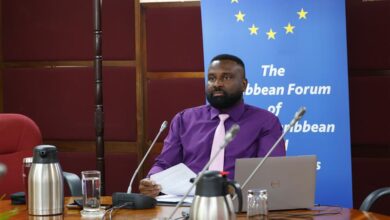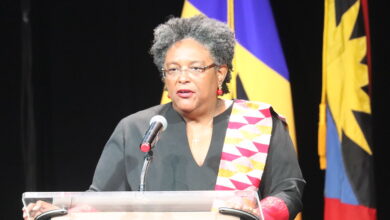By Nelson A. King UNITED NATIONS, Oct 1, CMC –The 69th session of the United Nations General Assembly (UNGA) debate ended here on Tuesday night with two Caribbean Community (CARICOM) countries – Belize and the Bahamas – identifying what they regard as top priorities for their respective countries.
Belize’s Minister for Foreign Affairs and Foreign Trade, Wilfred Elrington, said that sustained and inclusive economic growth and safeguarding the future of the planet were imperatives for his country.
He said these are aimed at sustainable development with the eradication of poverty and hunger at its core.
“(We) must inspire and equip all actors in our societies with the requisite tools to shoulder their responsibilities and partake in the dividends of sustainable economic growth with equity and social justice,” he said.
However, without cooperation and support from developed member-states, multilateral agencies and reformed policies of the international financial institutions, Elrington said his country’s efforts to attain the post-2015 development agenda would be stymied.
He welcomed adoption of General Assembly resolution, A/RES/304, on sovereign debt restructuring, expressing hope it would lead to a multilateral treaty that would increase the efficiency and stability of the international financial system.
Elrington said climate change was the “most pernicious of mankind’s problems,” adding that while there was consensus as to its causes and cure, the political will to take urgent action to combat it was lacking from the major emitters.
The Belize foreign affairs minister said the cost of mitigating climate change damage in his country and of adaptation was “prohibitive” and urged the large emitters to commit to capping global warming at 1.5?celcius above pre-industrial levels.
Among domestic initiatives, Elrington said there was a program of infrastructure works, which would lead to better transport of goods produced in his country, while providing employment for many young people.
He said while the government spent 26 per cent of its budget on transforming an inherited colonial educational system to one that meets the needs of an independent 21st century country that was still not nearly enough.
Elrington said 13 per cent of the country’s budget went to the health sector, aiming first at prevention.
On the role of women and girls, he called for support of their financial health based on the Beijing Platform for Action.
Elrington said that it was “a false dichotomy to pit development against the environment, which was why the world must embrace the sustainable development approach”.
In his address to the UNGA, Bahamas Foreign Minister Fred Mitchell said that the environment, fighting crime and containing illegal immigration were his country’s top priorities.
“If we do not resolve climate change issues, there will be no Bahamas,” he warned, adding that the United Nations Framework Convention on Climate Change should be the primary intergovernmental forum for negotiating the global response to that issue.
Mitchell also pointed to the proliferation of gang activity, illicit drugs, and small arms and ammunition trafficking as issues of concern.
As such, he said his country was involved in the negotiations leading to the adoption of the Arms Trade Treaty, and had ratified it on September 25.
The foreign affairs minister also said the Bahamas would also rely on social intervention programs, like the Urban Renewal initiative, in order to fight the illegal drug trade and serious crime.
At the same time, he said the country is grappling with illegal immigration.
He said the recent Memorandum of Understanding signed with the International Organization for Migration (IOM) was one part of a multifaceted strategy aimed at stemming the flow of undocumented foreigners into Bahamian territory.
Mitchell said a new fleet of vessels has been purchased to support ongoing work in that area.
He told the General Assembly that recently the Bahamas entered into key fishing and migration agreements with the Dominican Republic, Cuba and Haiti.
But despite challenges, Mitchell said bilateral relations remain strong.
That was all the more reason why the Bahamas found the economic embargo by one neighbouring country against another ?counterproductive to the peace and good order of the region”, said Mitchell, clearly alluding to the half-century old United States economic and trade embargo against Cuba.





